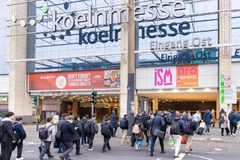Avery Dennison highlights RFID tech potential for parcel supply chain efficiency
Avery Dennison has partnered with the University of Memphis Automatic Identification Lab, US, to launch the RFID in Parcel exhibit, a new showcase designed to demonstrate the transformative potential of Radio Frequency Identification (RFID) technology in parcel logistics.
The exhibit highlights how RFID can streamline return operations at the shipper, ensuring accurate parcel sortation and shipment processes while providing visibility throughout the parcel journey.
“By working together with a respected institution that shares our passion for technology, we can combine our skills to inspire the next generation of engineers and innovators,” says Julie Vargas, vice president and general manager at Avery Dennison Identification Solutions.

“This exhibit not only highlights the capabilities of RFID technology but also serves as a platform for academic research and industry applications. We believe that through education and hands-on experience, we can enhance operational efficiency, reduce costs and foster sustainability within the supply chain, ultimately benefiting businesses and consumers.”
Driving sustainability
The RFID in Parcel partnership between Avery Dennison and the University of Memphis has grown into a permanent installation, aiming to enhance learning and drive innovation in automatic identification technologies.
Results from the showcases include a reported 20% increase in productivity and 99% load accuracy. Automated possession scans at the shipper further underscore RFID’s potential to improve parcel logistics.
The launch event featured a panel discussion titled “RFID in Parcel: Shipper to Consumer Visibility,” focusing on the benefits of connected IDs, such as RFID, in enhancing package visibility, automating manual scan processes and increasing data accuracy along the fulfillment journey. Panelists discussed how parcel carriers, with better data, can unlock more accurate predictive analytics and optimize route and labor planning to help reduce their carbon footprint.
The University of Memphis furthermore announced it would host a series of events for stakeholders, promoting ongoing exploration of RFID’s applications in real-world settings.
In similar developments, UK café operator Alasdair Hood developed Delete Cups, an RFID-based reuse system designed to replace single-use cups with a simple, cost-effective alternative. The system has been successfully trialed at two pop-up cafés.
Last year, McDonald’s France increased its use of reusable containers by integrating Checkpoint System’s RFID technology, supporting its commitment to reducing packaging waste and enhancing recycling efforts.











